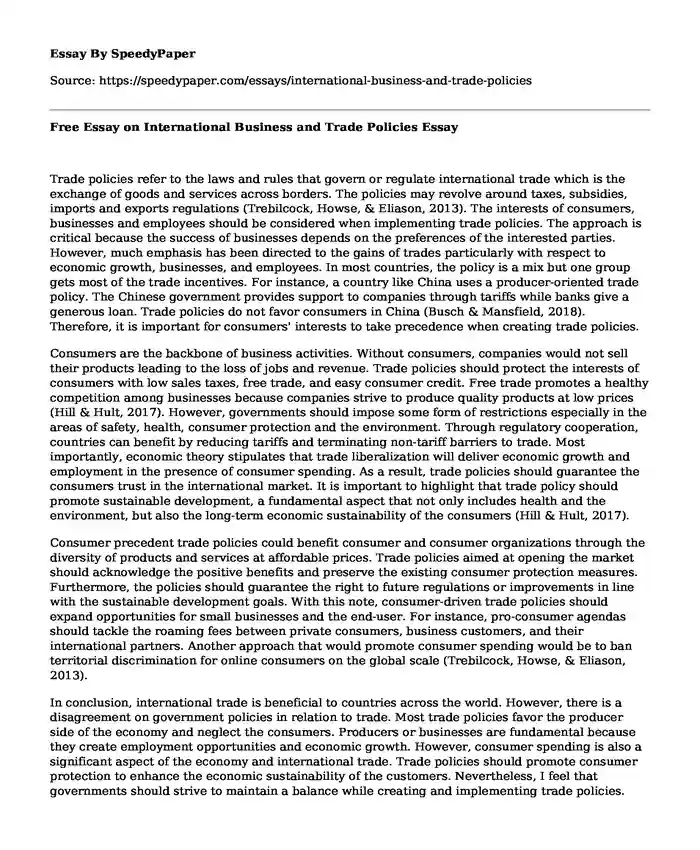
| Type of paper: | Essay |
| Categories: | Policy International business |
| Pages: | 3 |
| Wordcount: | 610 words |
Trade policies refer to the laws and rules that govern or regulate international trade which is the exchange of goods and services across borders. The policies may revolve around taxes, subsidies, imports and exports regulations (Trebilcock, Howse, & Eliason, 2013). The interests of consumers, businesses and employees should be considered when implementing trade policies. The approach is critical because the success of businesses depends on the preferences of the interested parties. However, much emphasis has been directed to the gains of trades particularly with respect to economic growth, businesses, and employees. In most countries, the policy is a mix but one group gets most of the trade incentives. For instance, a country like China uses a producer-oriented trade policy. The Chinese government provides support to companies through tariffs while banks give a generous loan. Trade policies do not favor consumers in China (Busch & Mansfield, 2018). Therefore, it is important for consumers' interests to take precedence when creating trade policies.
Consumers are the backbone of business activities. Without consumers, companies would not sell their products leading to the loss of jobs and revenue. Trade policies should protect the interests of consumers with low sales taxes, free trade, and easy consumer credit. Free trade promotes a healthy competition among businesses because companies strive to produce quality products at low prices (Hill & Hult, 2017). However, governments should impose some form of restrictions especially in the areas of safety, health, consumer protection and the environment. Through regulatory cooperation, countries can benefit by reducing tariffs and terminating non-tariff barriers to trade. Most importantly, economic theory stipulates that trade liberalization will deliver economic growth and employment in the presence of consumer spending. As a result, trade policies should guarantee the consumers trust in the international market. It is important to highlight that trade policy should promote sustainable development, a fundamental aspect that not only includes health and the environment, but also the long-term economic sustainability of the consumers (Hill & Hult, 2017).
Consumer precedent trade policies could benefit consumer and consumer organizations through the diversity of products and services at affordable prices. Trade policies aimed at opening the market should acknowledge the positive benefits and preserve the existing consumer protection measures. Furthermore, the policies should guarantee the right to future regulations or improvements in line with the sustainable development goals. With this note, consumer-driven trade policies should expand opportunities for small businesses and the end-user. For instance, pro-consumer agendas should tackle the roaming fees between private consumers, business customers, and their international partners. Another approach that would promote consumer spending would be to ban territorial discrimination for online consumers on the global scale (Trebilcock, Howse, & Eliason, 2013).
In conclusion, international trade is beneficial to countries across the world. However, there is a disagreement on government policies in relation to trade. Most trade policies favor the producer side of the economy and neglect the consumers. Producers or businesses are fundamental because they create employment opportunities and economic growth. However, consumer spending is also a significant aspect of the economy and international trade. Trade policies should promote consumer protection to enhance the economic sustainability of the customers. Nevertheless, I feel that governments should strive to maintain a balance while creating and implementing trade policies. Since international trade is successful due to the various parties involved, trade policies should promote consumer and business sustainability as well as economic growth and development.
References
Busch, M. L., & Mansfield, E. D. (2018). Trade: Determinants of Policies. Oxford Research Encyclopedia of International Studies. Doi:10.1093/acrefore/9780190846626.013.350
Hill, C. W., & Hult, G. T. (2017). International Business: Competing in the Global Marketplace.
Trebilcock, M. J., Howse, R., & Eliason, A. (2013). The regulation of international trade. London: Routledge.
Cite this page
Free Essay on International Business and Trade Policies. (2022, Apr 07). Retrieved from https://speedypaper.com/essays/international-business-and-trade-policies
Request Removal
If you are the original author of this essay and no longer wish to have it published on the SpeedyPaper website, please click below to request its removal:
- Montreaux Initiative Essay Example
- Reflective Essay Sample
- A Journey to Face Death in "Mid-Term Break" by Seamus Heaney
- Free Essay: Physical Therapist in the Military Field
- Free Essay Sample on Supplier Base Reduction
- Communication Skills for Nurses and Midwives, Free Essay
- Paper Example. Interoperability Practices
Popular categories




